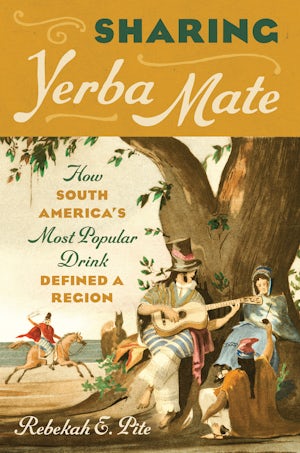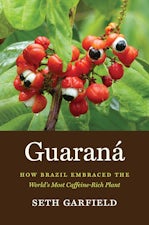Sharing Yerba Mate
How South America's Most Popular Drink Defined a Region
By Rebekah E. Pite
310 pp., 6.125 x 9.25, 36 halftones, 4 maps, 3 graphs, notes, index
-
Paperback ISBN: 978-1-4696-7453-7
Published: September 2023 -
Hardcover ISBN: 978-1-4696-7452-0
Published: September 2023 -
E-book EPUB ISBN: 978-1-4696-7454-4
Published: September 2023
Buy this Book
- Paperback $29.95
- Hardcover $99.00
- E-Book $22.99
For Professors:
Free E-Exam Copies
Awards & distinctions
2024 Arthur P. Whitaker Prize, Middle Atlantic Council of Latin American Studies
USA Winner, Gourmand World Cookbook Awards, Alcohol Free Drinks
USA Winner, Gourmand World Cookbook Awards, Digital
USA Winner, Gourmand World Cookbook Awards, Latin America - Published Outside Latin America
This global history takes us from the colonial Río de la Plata to the top yerba-consuming and producing nations of Argentina, Brazil, Paraguay, and Uruguay, with excursions to Chile, the Middle East, Europe, and the United States, where yerba mate is now sold as a "superfood." For readers eager to understand South America and its unique drink, Sharing Yerba Mate is an essential text that delves into an everyday ritual to expose systems of power and the taste of belonging.
About the Author
Rebekah E. Pite is professor of history at Lafayette College and author of Creating a Common Table in Twentieth-Century Argentina: Doña Petrona, Women, and Food.
For more information about Rebekah E. Pite, visit
the
Author
Page.
Reviews
"Beautifully written and solidly grounded in multisite archival research. Pite displays a command of scholarly methodologies of the histories of Latin America, nationalism, and commodities, as well as visual culture and food studies."—Jeffrey M. Pilcher, author of Planet Taco: A Global History of Mexican Food
"Working from the premise that the culture surrounding yerba mate (ka’a) needs to be studied from a broad regional perspective, Pite confidently crosses linguistic and political boundaries to shed light on how the infusion has shaped ideas about class, race, gender, and nation in southern South America."—Bridget Chesterton, author of The Grandchildren of Solano López: Frontier and Nation in Paraguay, 1904–1936
"Like an expert cebadora, Pite serves up a rich, complex, and deeply sensory brew—a story of yerba mate that spans centuries, empires, nations, environments, trade circuits, and preparations, yet fits satisfyingly in our hands. Throughout, Pite reveals how yerba mate’s production and consumption created bonds of community among South Americans even as it bound many in enduring hierarchies of difference and exploitation."—Paulina L. Alberto, Harvard University, author of Black Legend: The Many Lives of Raúl Grigera and the Power of Racial Storytelling in Argentina
"The consumption of mate is a familiar feature of the societies bordering the Río de la Plata. Less well known is the role this beverage played in constructing social and national identities in this region. This beautifully written and illustrated book explains how and why this occurred. In doing so, it provides fresh perspectives on gender, race, class, labor, the urban-rural divide, business practices, and politics in these nations. It is a fascinating story that will captivate scholars and the general public alike."—Sandra McGee Deutsch, professor emerita, University of Texas at El Paso




